
Why the death of one rice farmer has captivated South Korea
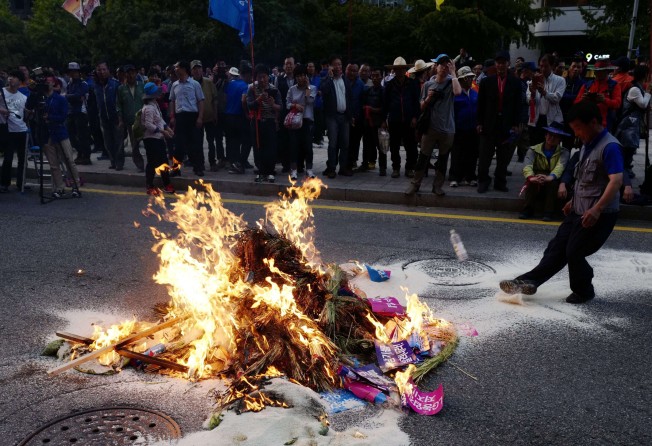
Early one Saturday morning in November of last year, farmer Baek Nam-gi left his home in the rural south of South Korea, and with dozens of fellow farmers, boarded a bus bound for Gwanghwamun Square, a public space in the heart of the capital, Seoul, and a frequent venue for protests.
On that day, Gwanghwamun was the site of an exceptionally tense demonstration against the conservative government of President Park Geun-hye. Baek and his colleagues were pushing for intervention in the rice market, asking the government to guarantee purchase of excess supply in order to keep prices up. The farmers said that with bumper harvests causing a supply glut, prices had fallen so low they were barely scraping by.
That day’s protests turned violent, with dozens of arrests after activists clashed with police. By the end of the day, a haunting image of Baek was being shared widely across the Korean language internet, showing the 68-year-old splayed on his back, awash in the frothy discharge from police water cannons.

During the protest, Baek was hit by the jet from a water cannon, fell back, hit his head and lost consciousness. He was taken to hospital, and for the next several months, as he lay in a coma, his name became a rallying cry for the country’s liberal opposition as a bitter debate broke out over whether the police spraying a water cannon at protesters was a legitimate, or excessive, use of force.
That debate picked up momentum this week, when after nearly ten months in a coma, Baek died, his passing coming at a time when rice prices are still tumbling, and South Korea’s farmers are growing more desperate.
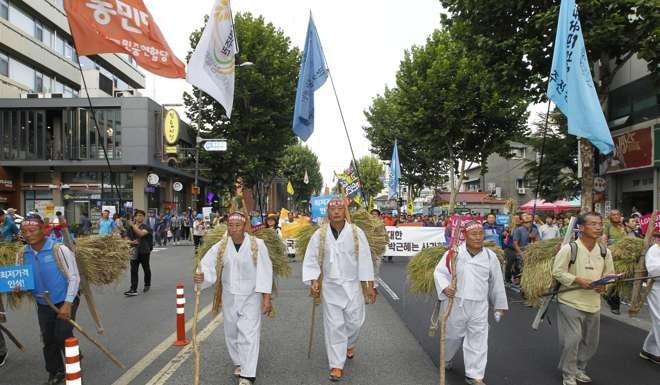
Three consecutive years of bumper harvests have created a spike in the supply of rice, which along with a decline in domestic consumption, has led to some of the lowest prices in years. Data from the country’s Ministry of Agriculture, Food and Rural affairs show a steady slide in prices since 2013, with an 80kg bag costing a little less than US$160 in that year, compared to around US$125 this month.
Rice has long been Korea’s staple food item. Fluffy white grains are served with breakfast, lunch and dinner, and the common daytime greeting isn’t “Hello” or “How are you?”, but “Have you had rice?” The importance of rice is underscored in music, visual art and literature, where it is often used as a metaphor for warmth and comfort. In many Korean stories, whether or not the characters have rice means the difference between death and survival, or comfort and destitution.
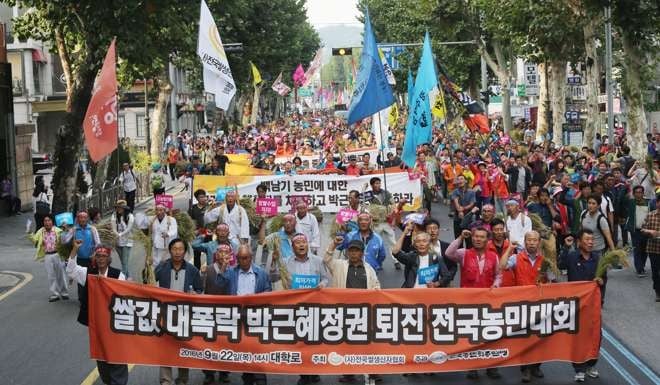
When making their case to the government, South Korean farmers tap into this centrality, appealing to the public’s emotions and the special place that rice occupies in the Korean psyche. At rallies, farmers wear grim facial expressions while holding placards with messages such as “Rice is Life,” and sometimes shed tears as they set fire to rice plants.
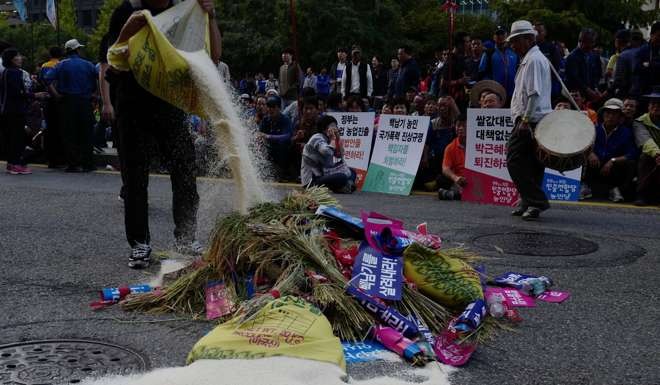
But at least in terms of government support, South Korean farmers already have it pretty good. Data from the Organisation for Economic Co-operation and Development show that of 36 countries surveyed, South Korea was second only to Turkey in the generosity of its support for agriculture.
And it’s not clear how effective a strategy government intervention in the rice market really is, said Stefan Tangermann, a retired professor of Agricultural Economics at the University of Göttingen in Germany. Tangermann said that “fiddling with market prices would create economic inefficiencies and also have negative impacts on consumer well-being. A more efficient and also more effective approach to supporting farmers’ incomes is to provide direct payments unrelated to the production of rice.”
So far, the government’s efforts to keep prices up haven’t amounted to much. “The government’s goal is to keep rice at 180,000 won [US$163] per 80kg bag, and they’ve tried to get it there by purchasing rice and keeping it off the market, but so far they haven’t been successful in elevating prices,” said Jo Nam-uk, a Korea Rural Economic Institute researcher specialising in rice policy.
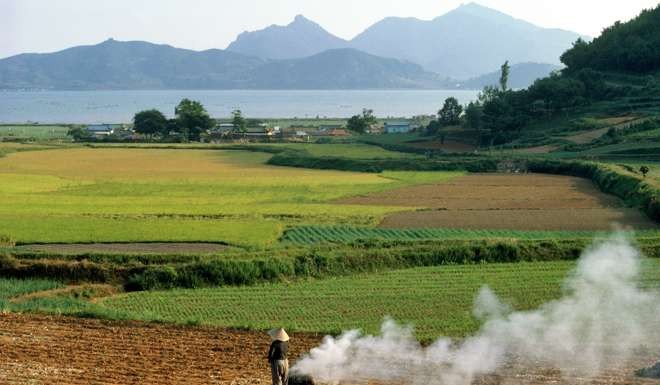
The farmers’ insistence that their government step in and set matters in their favour is a symptom of a particular situation in Korea, where interest groups of all kinds rely on their elected leaders for solutions, said Michael Breen, a Seoul-based historian and author of the forthcoming, The New Koreans: The Story of a Nation.
Breen said it was “the government that’s seen as ultimately responsible for everything here, regardless of what happens in the economy”.
Baek was a longtime activist, having protested against the authoritarian regimes that ruled South Korea in the 1970s and 80s, causing him to be twice expelled from university by government order. He was active in the street protests that pushed out the country’s military regime in 1988 and achieved multi-party democracy. But instead of settling in Seoul and taking up a public life in politics or journalism, as many other activists did, Baek returned to his home region and took up farming. His humble lifestyle further endeared him to supporters, and was recalled fondly by many grieving his death.
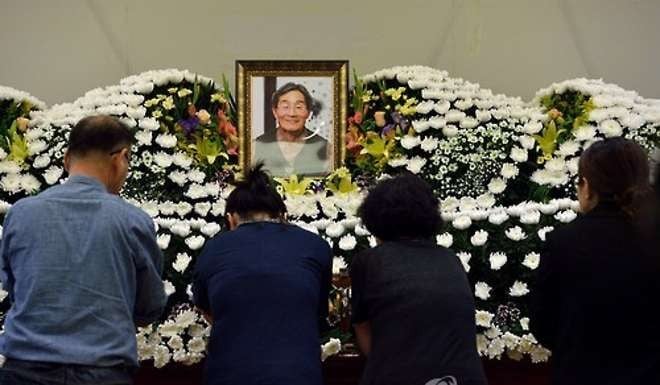
In recent years, though he struggled to make ends meet and remained politically engaged, Baek mostly enjoyed a quiet lifestyle, tending his fields and relaxing with his wife, son, two daughters and grandchildren. This week, another image of Baek made the rounds on Korean social media, this one of him smiling placidly in a funeral portrait, surrounded by white flowers atop a memorial altar. With that image being displayed at supporters’ events across the country, Baek’s memory may be sowing new seeds for the farmers’ movement to keep trudging along.
Steven Borowiec is a journalist based in Seoul